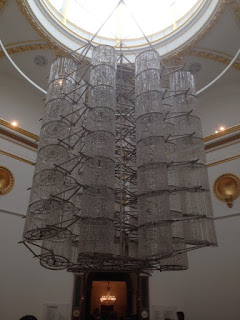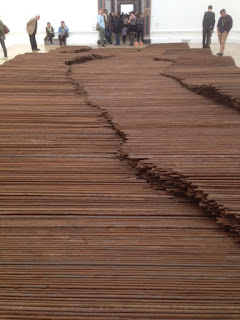 |
| Entrance to the Royal Academy. Trees assembled from fragments by Ai Wei Wei. |
So, as a consequence, the art world cabals have searched high and low to find someone that can replace their darlings.
Because art can't just simply be beautiful - I am aware that is another form of political statement so spare me- its 'content' has to be explained through politics or personal tragedy, or something along those lines. I am not saying depression, domestic violence or the measles are not serious. I am not denying capitalism as we suffer it is a true competitive arena subject to fair equitable rules. Far from it. But it helps when there is, in fact, a government that beats you up, puts you under surveillance and messes things up for you in various violent, dumb and uncreative ways. Walk in Ai Wei Wei, The People's Party is your bitch.
 |
| From S.A.C.R.E.D. a huge diorama depicting episodes of his ordeal |
The Chinese government has fucked up this man's life into the stratosphere ...of fame. If anything, the exhibition at The Royal Academy demonstrates the amount of money and manpower that Ai WeiWei can summon with a simple maxim in his famously sparse grunting. He is a star and despite my diatribe, let me hurry to point out I loved the exhibition. More for the questions if creates than for the artwork itself. I even got tears in my eyes when confronted to the rebar pieces of "Straight", a massive 90 ton installation honoring the victims of the Seichuan earthquake and condemning the greed, corruption and the criminal ineptitude of Chinese officials.
Ai WeiWei is a charismatic man, no doubt. When he ventured into New York as a younger man he really -really- absorbed the trends and ideas reigning in the Western art world. In a way, he has been doing what most Saatchi pet wannabes and suck-ups have been dreaming of for years. With a crew of skilful craftsmen no less.
 |
| "Stroller" carved in marble. |
May be that is why so many of his pieces are accumulations: 3,000 porcelain crabs, 60 hand-chiseled marble pieces of grass, thousands of painstakingly straightened rebar pieces, etc... If you have been to an art gallery recently, it is very likely that you have experienced this tendency to pile up crap and then conjure a meaning: "Oh, my dad used to hit me with the slippers so here, a million slippers in a pile". Ai WeiWei does that. But he does it well, as if to preclude any more lame strewn piles of shit in the future. If you've seen one of Ai Wei Wei's gatherings of rubble, you will never find time for another mindless heap of tuna cans or human hair balls in your life.
 |
| "Chandelier' Glass and bycicle frames. |
More interesting is the use -obsession really- of recycling Quing dynasty furniture or rubble from China's destroyed past into a new life using armies of craftsmen. (How does he pay them? I wonder. In fact, how does he make money?) Some of this recycling has been controversial as in his deliberate destruction of a Quing dynasty vase and the pulverization of neolithic ceramics into fine dust. I can come up with many different explanations for this acts, all very satisfying, but they all hurt a bit despite it all. Mostly it comes down to a lot more people aware of that shattered vase now than ever before.
 |
| Quing Dinasty Stools re-assembled. |
 |
| "Straight" rebar pieces recovered from Sichuan buildings destroyed in 2008 |